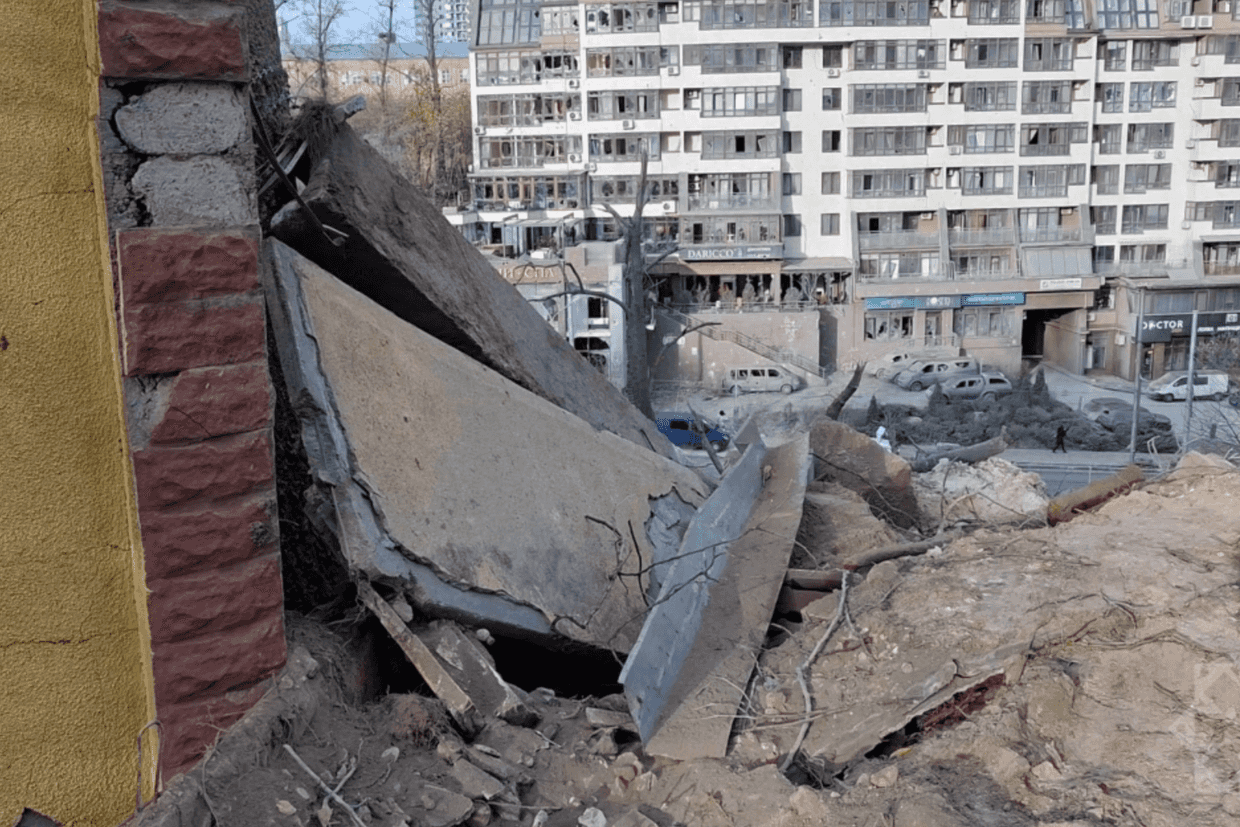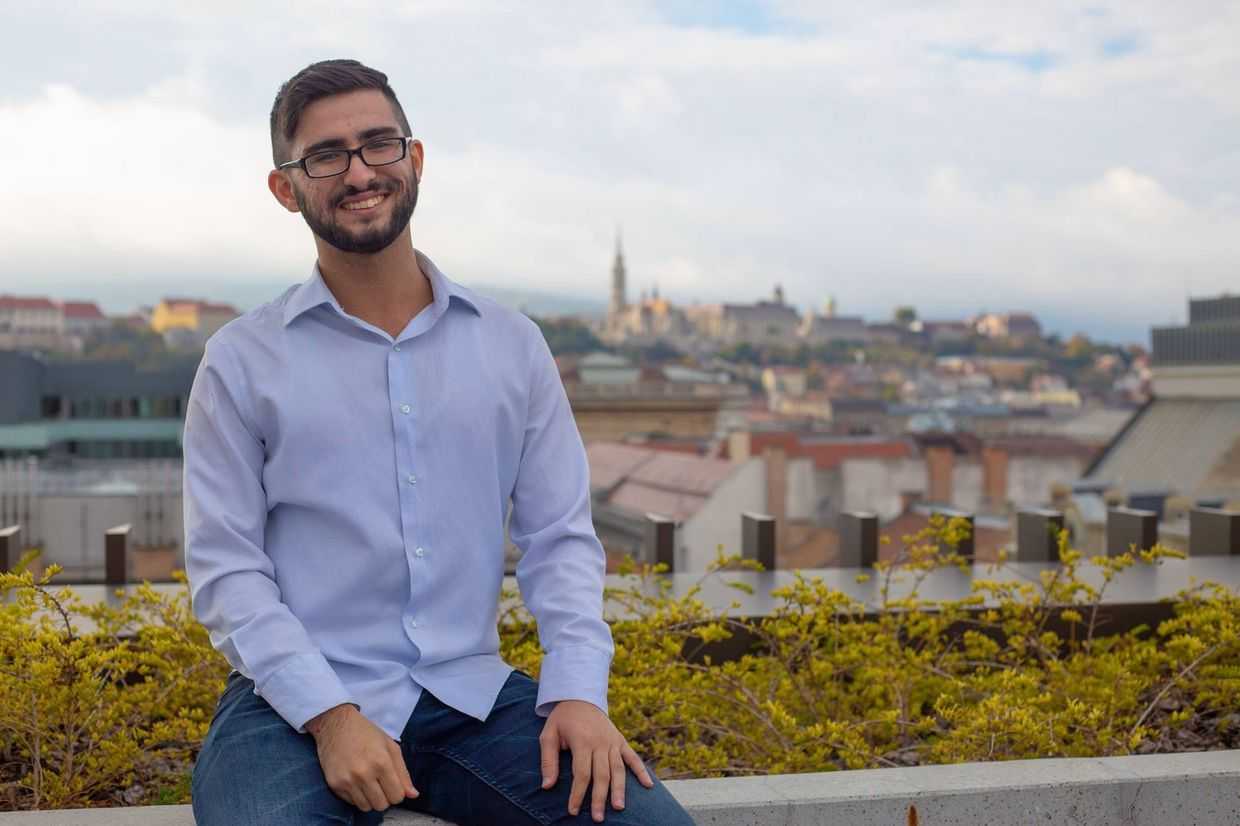
The arrest, conviction, and subsequent hunger strike of Tofig Yagublu has resonated with many Azerbaijanis both inside Azerbaijan and abroad.
‘I went to the protest because it was about a patriotic man who was unjustly arrested — to show that I believe that he’s innocent. It is unacceptable that he stays [in prison] even a day’, Tural Nuru tells OC Media.
Tural is not currently a member of any political party in Azerbaijan, but on 9 September, he was among dozens of people to protest in Baku for the release of Tofig Yagublu.
Several other demonstrations have been held in Baku, as well as by Azerbaijanis in Toronto, Istanbul, and Berlin.
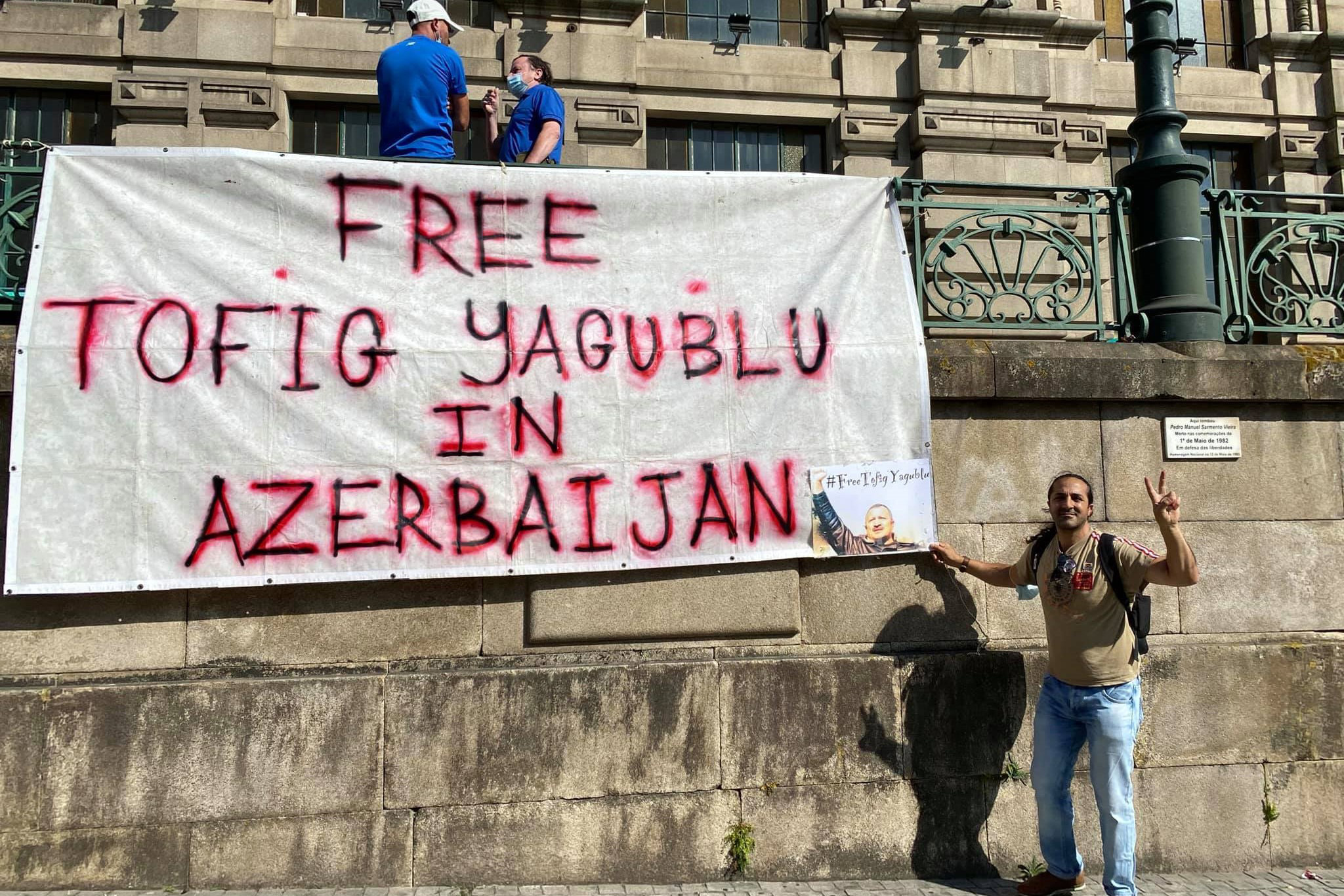
‘Tofig Yagublu has a great deal of sympathy from the Azerbaijani people because he is brave, he always stands by his word, he has not sold out like others,’ Tural says.
‘In general, Yagublu’s family is a very long-suffering family […] one of his daughters died, some of them were arrested, but they never broke down and have continued their fight. That’s why they are loved by people’, he says.
Tofig Yagublu is one of the leaders of the country’s oldest party — the Musavat. On 3 September, he was sentenced to four years and three months in prison on what his lawyers and rights groups insist are trumped-up charges.
His family includes several well-known human rights defenders and opposition activists. Daughters Nigar and Nargiz both started their activist work in 2009, with Nigar also spending time in prison for a case which her lawyers insisted was fabricated.
Yagublu, was previously arrested during the 2013 Ismayilli protests and spent two years in prison. After being detained again following an opposition rally in October 2019, he said he was tortured and that officials threatened to kill his children.
Police quickly surrounded 9 September’s demonstration, dispersing the protesters and detaining several dozen people.
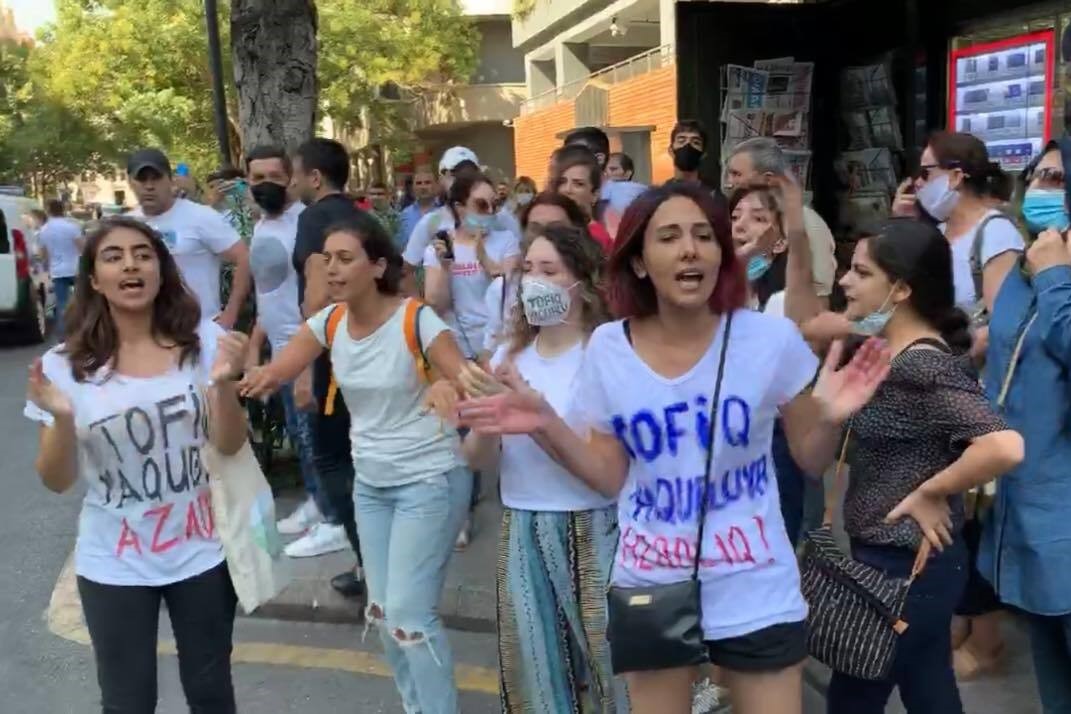
[Read more on OC Media: OC Media contributor detained as police disperse Tofig Yagublu solidarity protest in Baku]
Despite being detained, Tural insists he does not regret participating. ‘Of course, I think about my family and my four children, but still, it’s a matter of conscience’, he concludes.
Hunger strikes inside and outside of Azerbaijan
Since beginning his hunger strike on 2 September, Yagublu has insisted he will not stop until he is released or until his death. Dozens of people both inside and outside of the country have joined him, going on hunger strike in solidarity.
One such hunger strike is underway at the headquarters of the opposition Musavat party in Baku.
Elman Guliyev chairs the party’s youth wing and is on hunger strike himself. Elman tells OC Media that three activists from the opposition Popular Front Party are on hunger strike with him.
‘Many people want to join the hunger strike, but they can’t do it because of the pandemic and the space limitation’, Elman says.
Despite the health of some activists worsening, with an ambulance being called several times, Elman says they are determined to continue ‘as long as Tofig Yagublu continues his hunger strike’.

The hunger strikes have also reached Germany, a haven for Azerbaijani journalists, human rights defenders, and members of the opposition in exile.
Afgan Mukhtarli, a Berlin-based journalist who spent around three years in prison in Azerbaijan, has organised a hunger strike in front of the German Parliament along with three exiled activists.
Since beginning on 7 September, they have been calling on Germany and other European countries to apply ‘Magnitsky type sanctions’ against Azerbaijani President Ilham Aliyev and other high-ranking officials.
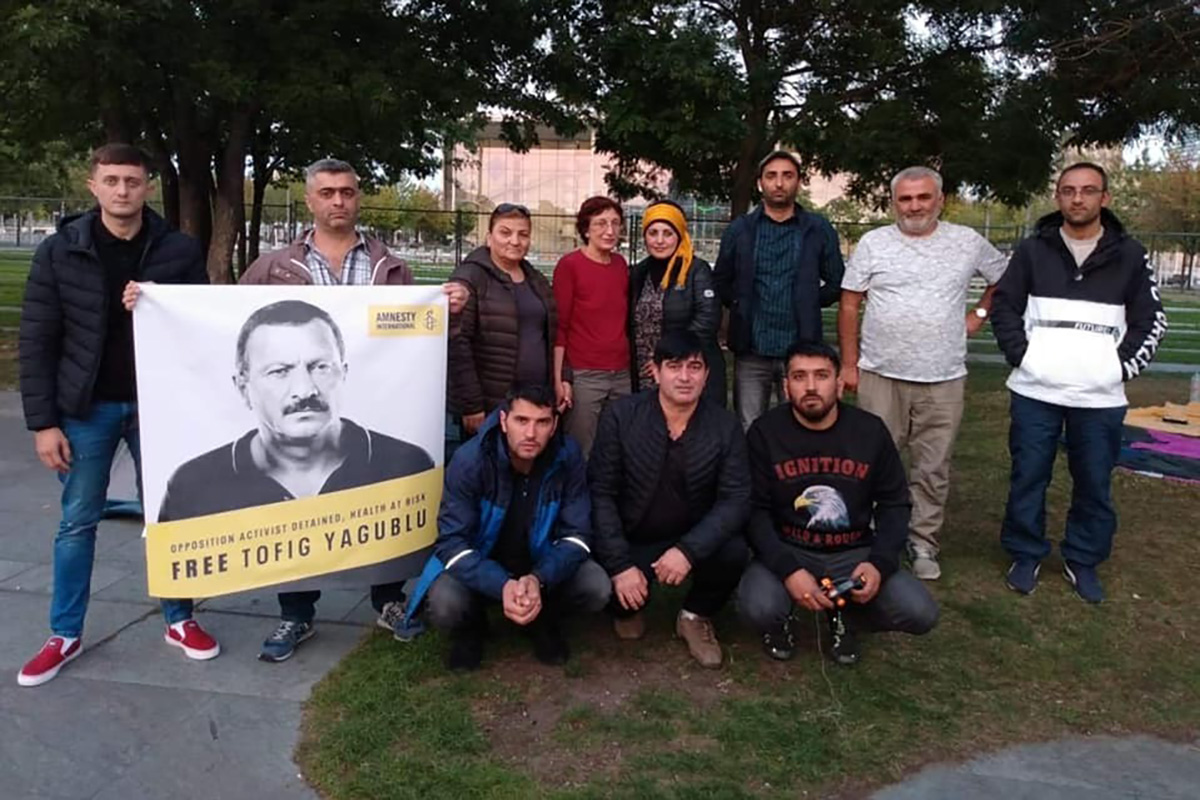
‘There are more people from different parts of Germany who want to join our action’, Mukhtarli tells OC Media. ‘We want to spread these actions throughout all of Germany, to demand the release of all the political prisoners, including Tofig Yagublu.’
According to Mukhtarli, 15 Azerbaijanis throughout Germany went on hunger strike, including in front of the UN Office in Nuremberg.
‘We political immigrants living in Germany will hold such actions demanding fundamental changes in Azerbaijan’, he says.
On 15 September, however, Mukhtarli said they were going to end their strike. ‘German police do not agree with the continuation of our hunger strike. They treat hunger strikes very seriously here, unlike in Azerbaijan.’
However, he said they would continue with other forms of protest.
‘The perfect candidate for arrest’
Yagublu has received widespread international support, including from the EU, the American, British, and French embassies in Baku, the Council of Europe’s Commissioner for Human Rights, and the Parliamentary Assembly of Council of Europe.
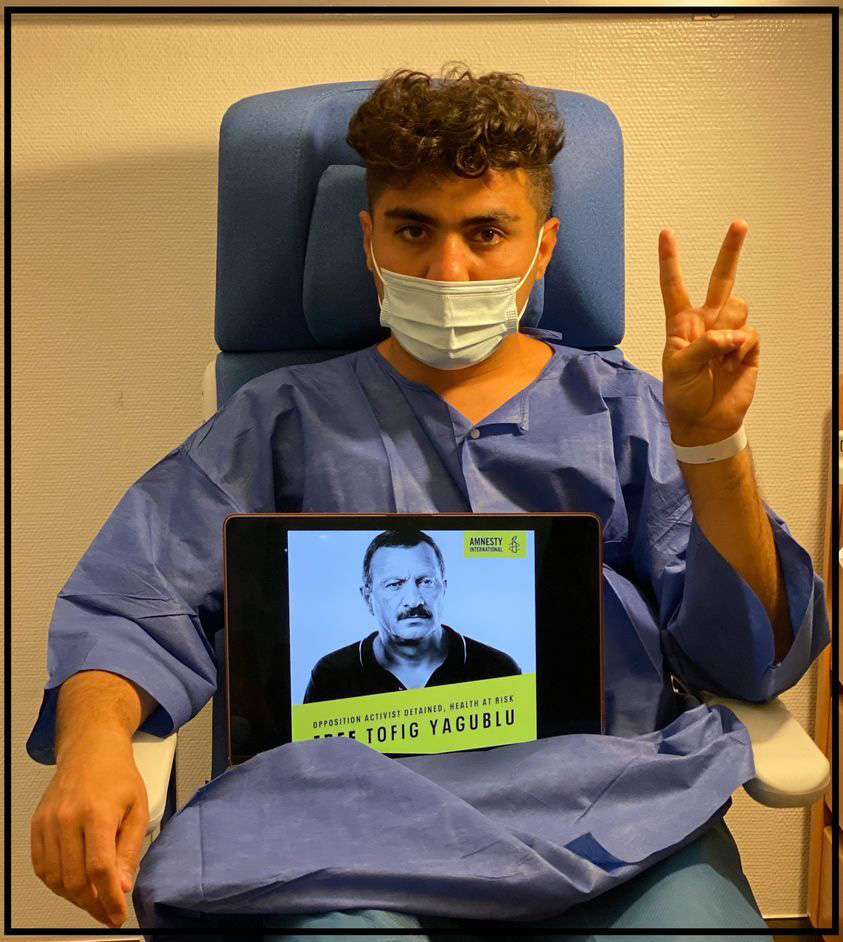
Several international human rights organisations have also condemned his prosecution, while local human rights defenders have appealed to the authorities to consider Yagublu’s appeal.
The opposition block the National Council of Democratic Forces has demanded his urgent release. Several leaders of small political parties also appealed to President Ilham Aliyev with a request ‘to take the case of Yagublu under your special control’.
Unusually for Azerbaijan, support has also come from several sitting MPs.
Sabir Rustamhanli, an MP and the head of the Civic Solidarity Party, condemned Yagublu’s arrest. Erkin Gadirli, an MP from the opposition ReAl party stated on 4 September that ‘Yagublu should be released’.
Meanwhile, the Baku Press Club, a community of journalists, published an op-ed by Seymour Kazimov in which he argued that Tofig Yagublu is innocent and that the media should not shy away from stating so.
‘Journalists who write this openly do not violate professional principles, because the concept of truth in journalism is based on the accuracy of facts’, he wrote.
Arastun Orujlu, a Baku-based political analyst and the head of the East-West Research Centre, told OC Media that the reason Yagublu’s arrest has resonated so strongly, besides his personality, had to do with social tensions, the changing political environment, and foreign policy.

‘People in difficult social situations, those with political aspirations, as well as countries interested in the region where Azerbaijan is located want to take advantage of this kind of opportunity.’
According to him, Yagublu’s jailing was likely an attempt to distract the public from other issues.
‘By focusing on such “thunderous” arrests, [the government] sets the agenda for public debate and keep other important issues for the country in the background,’ Orujlu said.
He said the government was also likely attempting to intimidate the opposition.
‘Finally, such arrests slow down the struggle between factions within the government, creating a kind of need for them to unite in the face of a “common enemy”.’
Orujlu noted that Yagublu was the ‘perfect candidate’ to be arrested by all these parameters.




